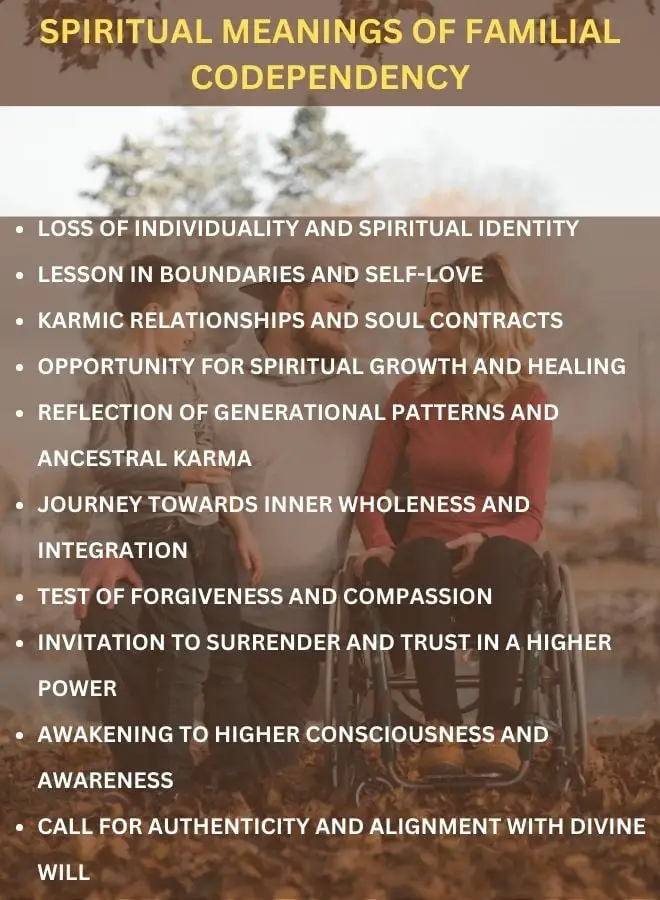Familial codependency offers a journey of self-discovery and spiritual growth, prompting individuals to reclaim their authenticity, set boundaries, and trust in divine guidance for healing and enlightenment.
In the intricate tapestry of human relationships, the bond between family members holds unique significance. From childhood to adulthood, our familial connections shape our identities, values, and behaviors.
However, amidst the love and support often associated with family, there can also exist a subtle yet powerful dynamic known as familial codependency. But what exactly does this term entail, and what deeper spiritual meanings lie beneath its surface?
Spiritual Meanings of Familial Codependency

1. Loss of Individuality and Spiritual Identity
In the hustle and bustle of familial codependency, individuals often lose sight of their true selves. They become entangled in roles and expectations, forgetting their unique essence and spiritual purpose. This loss of identity serves as a wake-up call, urging them to reclaim their authenticity and rediscover their connection to the divine.
2. Lesson in Boundaries and Self-Love
Familial codependency acts as a crucible for learning the importance of boundaries and self-love. It teaches individuals to honor their needs and prioritize their well-being, even in the face of familial expectations. Through this lesson, they cultivate a deeper sense of self-respect and compassion, laying the foundation for spiritual growth.
3. Karmic Relationships and Soul Contracts
Every familial relationship is imbued with spiritual significance, carrying echoes of past lives and soul contracts. Familial codependency may serve as a karmic lesson, presenting individuals with opportunities to heal past wounds and resolve ancestral karma. Within the web of codependency lies the potential for profound soul growth and liberation.
4. Opportunity for Spiritual Growth and Healing
Despite its challenges, familial codependency offers fertile ground for spiritual growth and healing. Through introspection and self-reflection, individuals can uncover the root causes of their codependent patterns and embark on a journey of inner transformation.
This process of healing not only frees them from the shackles of codependency but also deepens their spiritual connection.
5. Reflection of Generational Patterns and Ancestral Karma
Familial codependency often mirrors generational patterns and ancestral karma, passed down through the lineage like an invisible inheritance. By unraveling these patterns, individuals gain insight into their family’s collective journey and the lessons woven into their shared history.
This awareness empowers them to break free from the cycle of codependency and chart a new course for future generations.
6. Journey Towards Inner Wholeness and Integration
At its core, familial codependency is a journey of integration and wholeness. It beckons individuals to embrace all aspects of themselves—the light and the shadow, the strength and the vulnerability.
Through this journey, they come to realize that true healing lies in accepting and integrating every facet of their being, leading to a profound sense of inner peace and fulfillment.
7. Test of Forgiveness and Compassion
Forgiveness is a cornerstone of spiritual growth, and familial codependency presents individuals with ample opportunities to practice this virtue. By releasing resentment and judgment, they open their hearts to compassion and understanding, bridging the chasm of separation and fostering deeper connections with their loved ones.
In the crucible of forgiveness, wounds are healed, and bonds are strengthened, paving the way for reconciliation and harmony.
8. Invitation to Surrender and Trust in a Higher Power
In the midst of familial codependency, there is often a temptation to control outcomes and manipulate circumstances to alleviate discomfort. However, true liberation lies in surrendering to a higher power and trusting in the divine orchestration of life.
By relinquishing the illusion of control, individuals find peace amidst chaos and discover a profound sense of trust in the unfolding of their spiritual journey.
9. Awakening to Higher Consciousness and Awareness
Familial codependency serves as a catalyst for awakening, nudging individuals towards higher levels of consciousness and awareness. Through the veil of illusion, they glimpse the underlying unity of all creation and recognize the interconnectedness of their souls.
This awakening ignites a thirst for truth and wisdom, propelling them on a quest for self-realization and enlightenment.
10. Call for Authenticity and Alignment with Divine Will
Ultimately, familial codependency beckons individuals to embrace their authenticity and align with divine will. It challenges them to stand by their truth, regardless of external pressures or expectations. In the crucible of codependency, they discover the power of authenticity and the freedom that comes from living in alignment with their spiritual essence.
Variations and Spiritual Meanings of Familial Codependency
Parent-Child Codependency Dynamics
Parent-child codependency dynamics often stem from unresolved childhood wounds and unmet needs. The parent may seek validation and purpose through their child, while the child may feel responsible for the parent’s emotional well-being.
This dynamic reflects a deeper spiritual lesson about the interplay between love and attachment, inviting both parties to cultivate healthy boundaries and mutual respect.
Sibling Codependency and Rivalry
Sibling codependency can manifest as a complex dance of competition and comparison, fueled by unresolved childhood traumas and perceived parental favoritism. Underneath the surface, there lies a spiritual lesson about embracing diversity and celebrating each other’s unique gifts.
By releasing the grip of rivalry and embracing siblinghood as a sacred bond, individuals can forge deeper connections and support each other’s growth.
Spousal Codependency and Enmeshment
Spousal codependency often arises from a deep-seated fear of abandonment and a longing for intimacy. In this dynamic, partners may lose themselves in each other, seeking validation and fulfillment through the relationship. However, beneath the illusion of fusion lies a spiritual call to cultivate independence and self-love.
By honoring their individuality and nurturing their own inner light, partners can create a relationship based on mutual respect and authentic connection.
Extended Family Dynamics and Interdependence
Extended family dynamics encompass a wide range of relationships, from grandparents to cousins, aunts, and uncles. Within this web of connections, familial codependency may manifest in subtle ways, such as excessive caretaking or emotional manipulation.
However, beneath the surface lies a spiritual lesson about the interconnectedness of all beings and the power of community. By fostering a sense of interdependence and mutual support, extended families can become a source of strength and resilience.
Cultural Influences on Familial Codependency
Cultural norms and expectations can significantly impact familial dynamics, shaping the way individuals perceive their roles and responsibilities within the family unit. In some cultures, there may be an emphasis on collectivism and sacrifice, while in others, individualism and autonomy may be prized.
These cultural influences reflect deeper spiritual values and beliefs, inviting individuals to explore their own cultural heritage and redefine their relationship with familial codependency.
Economic Factors and Codependent Relationships
Economic factors can also play a significant role in familial codependency, influencing power dynamics and decision-making within the family unit. In financially unstable environments, individuals may feel compelled to sacrifice their own needs for the sake of survival, leading to codependent patterns of behavior.
However, beneath the surface lies a spiritual lesson about abundance and trust. By shifting their mindset from scarcity to abundance, individuals can break free from the cycle of codependency and manifest prosperity in all areas of their lives.
Codependency in Caregiver Relationships
Caregiver relationships are characterized by a deep sense of responsibility and compassion, often leading to codependent dynamics. Caregivers may neglect their own needs in favor of the care recipient, sacrificing their well-being for the sake of duty. However, beneath the surface lies a spiritual lesson about self-care and balance.
By prioritizing their own well-being and seeking support when needed, caregivers can provide more effective care and create healthier, more sustainable relationships.
Impact of Trauma and Abuse on Familial Codependency
Trauma and abuse can have a profound impact on familial dynamics, perpetuating patterns of codependency and dysfunction. Individuals who have experienced trauma may seek refuge in codependent relationships, craving validation and security amidst their pain.
However, beneath the surface lies a spiritual call to heal and reclaim one’s power. By confronting their trauma and seeking professional support, individuals can break free from the cycle of codependency and cultivate resilience and empowerment.
Codependency in Blended Families
Blended families face unique challenges when it comes to navigating codependency dynamics, as individuals must reconcile multiple sets of expectations and boundaries. In this complex web of relationships, familial codependency may manifest in conflicts over loyalty and allegiance.
However, beneath the surface lies a spiritual opportunity for growth and transformation. By fostering open communication and empathy, blended families can create a harmonious and supportive environment where all members feel seen, heard, and valued.
Role of Addiction in Familial Codependency
Addiction can exacerbate familial codependency, fueling a cycle of enabling and dysfunction within the family unit. Loved ones may become enmeshed in the addict’s behavior, sacrificing their own well-being in an attempt to maintain the status quo.
However, beneath the chaos lies a spiritual lesson about surrender and detachment. By releasing the need to control and trusting in the process of recovery, families can find healing and restoration.
Biblical Perspectives on Familial Codependency
Biblical teachings offer timeless wisdom on the nature of familial relationships and the spiritual significance of codependency dynamics.

Biblical Stories and Characters Reflecting Codependency
Throughout the Bible, there are numerous stories and characters that reflect the complexities of familial relationships and the consequences of codependency. From the tumultuous relationship between Jacob and Esau to the enmeshed bond between King Saul and David, these narratives offer insights into the spiritual dynamics at play within families.
Scriptural Teachings on Love, Boundaries, and Interdependence
The Bible offers clear guidance on the importance of love, boundaries, and interdependence within familial relationships. Scriptures such as “Love your neighbor as yourself” (Matthew 22:39) and “Honor your father and mother” (Exodus 20:12) underscore the value of compassion and respect within the family unit.
Additionally, passages like “Let your yes be yes and your no be no” (Matthew 5:37) emphasize the importance of setting healthy boundaries and honoring one’s own needs.
Redemption and Healing in Biblical Narratives
Despite the prevalence of dysfunction and codependency in biblical narratives, there is also a theme of redemption and healing woven throughout the scriptures. Stories of reconciliation, such as the prodigal son’s return and Joseph’s forgiveness of his brothers, illustrate the transformative power of love and forgiveness within familial relationships.
These narratives offer hope and encouragement to those grappling with codependency, reminding them that healing and restoration are always possible.
Guidance for Breaking Free from Codependency Patterns
The Bible provides practical guidance for breaking free from codependency patterns and cultivating healthier, more balanced relationships. Scriptures such as “Submit yourselves therefore to God. Resist the devil, and he will flee from you” (James 4:7) encourage individuals to surrender their codependent tendencies to a higher power and resist the allure of dysfunction.
By aligning themselves with divine wisdom and seeking support from spiritual communities, individuals can find the strength and courage to break free from codependency and embrace a life of freedom and abundance.
Hinduism’s View on Familial Codependency
In Hinduism, familial relationships are imbued with spiritual significance, reflecting the interconnectedness of all beings and the eternal cycle of karma and rebirth.
Hindu Mythology and Lessons on Family Dynamics
Hindu mythology is replete with stories that illuminate the complexities of familial relationships and the spiritual lessons embedded within them. From the epic tale of the Mahabharata to the divine love between Radha and Krishna, these narratives offer insights into the nature of attachment, duty, and devotion within families.
Concepts of Dharma and Duty in Familial Relationships
Central to Hinduism is the concept of dharma, or duty, which governs one’s obligations and responsibilities within familial relationships. Individuals are called to fulfill their duties with selflessness and integrity, regardless of personal desires or preferences.
This emphasis on duty serves as a safeguard against codependency, reminding individuals to prioritize their spiritual growth and evolution above all else.
Karma and Reincarnation: Understanding Familial Patterns
In Hinduism, familial codependency is viewed through the lens of karma and reincarnation, with individuals bound to their families through the cycle of birth and rebirth. Familial relationships are seen as opportunities for soul growth and evolution, with each interaction carrying echoes of past lives and karmic debts.
By understanding the deeper spiritual significance of familial patterns, individuals can transcend the cycle of codependency and find liberation in the eternal soul.
Spiritual Practices for Balancing Familial Relationships
Hinduism offers a rich tapestry of spiritual practices for balancing familial relationships and cultivating harmony within the family unit. Practices such as bhakti yoga, or the path of devotion, encourage individuals to cultivate a deep sense of love and reverence for their family members, seeing the divine presence within each soul.
Additionally, rituals such as puja and yagna provide opportunities for families to come together in worship and prayer, fostering a sense of unity and connection.
Cultural Significances of Familial Codependency
In every culture, familial relationships hold a sacred place, shaping the fabric of society and individual identity. Let us explore the cultural significance of familial codependency and uncover the spiritual truths it holds.
Influence of Culture on Family Structure and Dynamics
Culture plays a central role in shaping the structure and dynamics of familial relationships, influencing everything from gender roles to expectations of filial piety. Yet, within the constraints of culture lies the potential for liberation, as individuals learn to question and redefine societal norms.
Cultural Norms and Expectations in Familial Roles
Every culture has its own norms and expectations regarding familial roles and responsibilities, which can either support or hinder healthy, balanced relationships. Yet, within the confines of cultural expectations lies the potential for authenticity, as individuals learn to honor their true selves.
Rituals and Traditions Reinforcing Codependency Patterns
Rituals and traditions are an integral part of familial relationships, reinforcing bonds of love and connection. Yet, within the confines of tradition lies the potential for stagnation, as individuals are bound by outdated patterns and beliefs.
Impact of Societal Stigma on Seeking Help for Codependency
Societal stigma can prevent individuals from seeking help for codependency, fearing judgment or rejection from their families and communities. Yet, within the crucible of stigma lies the potential for liberation, as individuals find the courage to break free from the chains of shame and seek support.
Improving Spiritual Life in Familial Codependency
While familial codependency presents its challenges, it also offers an opportunity for profound spiritual growth and transformation. Let us explore ways to improve our spiritual life in the midst of codependent relationships and reclaim our innate divinity.
Practicing Self-Compassion and Forgiveness
Self-compassion is essential for healing from codependency, as it allows us to embrace our humanity and imperfections with kindness and acceptance. By practicing forgiveness—for ourselves and others—we can release the burdens of resentment and guilt, opening our hearts to love and healing.
Engaging in Spiritual Practices such as Meditation and Prayer
Spiritual practices, such as meditation, prayer, and reflection, are powerful tools for healing and transformation. By quieting the mind and connecting with the divine within, we can cultivate inner peace, clarity, and wisdom, allowing us to navigate the challenges of codependency with grace and resilience.
Embracing the Journey of Inner Healing and Transformation
Healing from codependency is a journey—a sacred quest for inner wholeness and integration. By embracing the process of healing and transformation with courage and humility, we can release the past, awaken to the present, and step boldly into the future, knowing that we are supported by the infinite wisdom and love of the universe.
Seeking Professional Help and Guidance when Necessary
While spiritual practices can be powerful tools for healing, they are not a substitute for professional help and guidance when needed. If you find yourself struggling with codependency or other mental health issues, don’t hesitate to reach out to a qualified therapist or counselor who can offer support, insight, and practical tools for healing.
Nurturing Authentic Connections Beyond Codependent Patterns
True healing from codependency requires a shift in consciousness—a willingness to release old patterns and embrace new ways of relating. By nurturing authentic connections based on mutual respect, trust, and freedom, we can break free from the bonds of codependency and experience the joy and fulfillment of truly interconnected relationships.
Surrendering to Divine Guidance and Trusting the Process
Ultimately, healing from codependency is a surrender—a surrender to divine guidance and the wisdom of the universe. By trusting in the process of healing and transformation, we can release our attachment to outcomes and surrender to the flow of divine grace, knowing that we are guided and supported every step of the way.
Conclusion
In the crucible of familial codependency lies a sacred journey—a journey of self-discovery, healing, and transformation. By embracing the spiritual meaning of codependency and reclaiming our innate divinity, we can transcend the limitations of the past and step boldly into the future, knowing that we are held in the loving embrace of the universe.
So let us embark on this journey together, with open hearts and minds, knowing that the path to wholeness and freedom awaits us.







